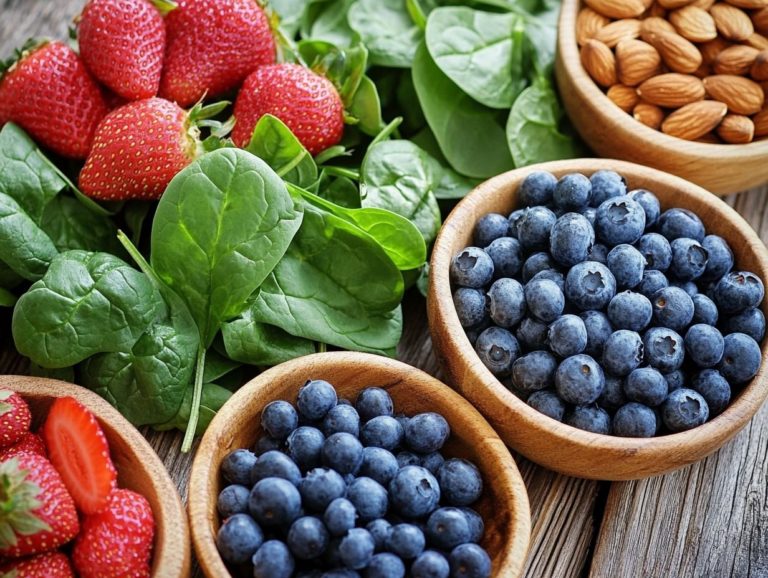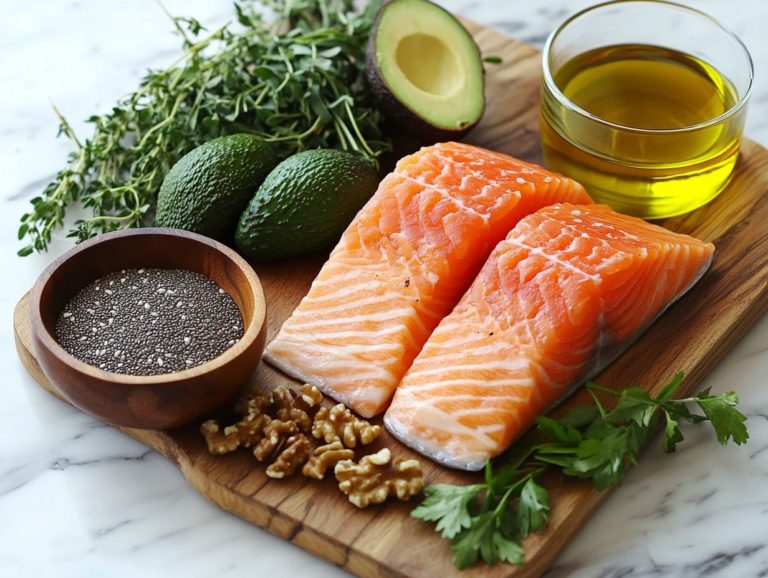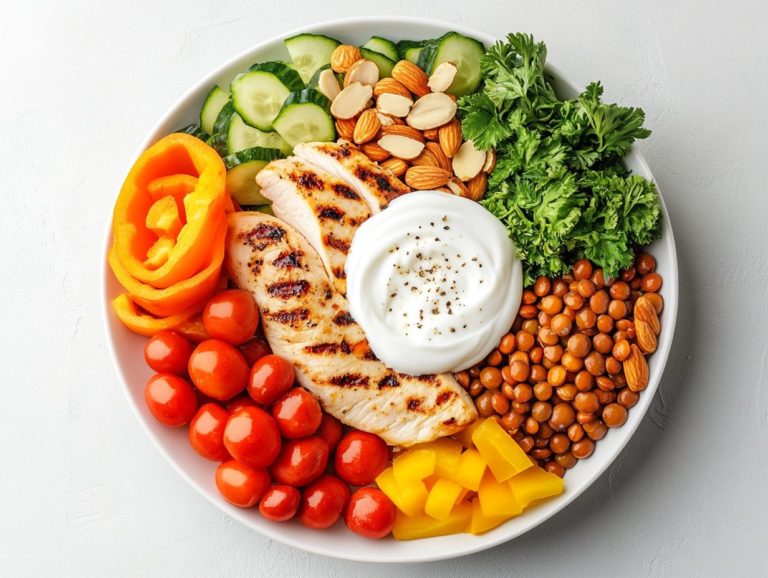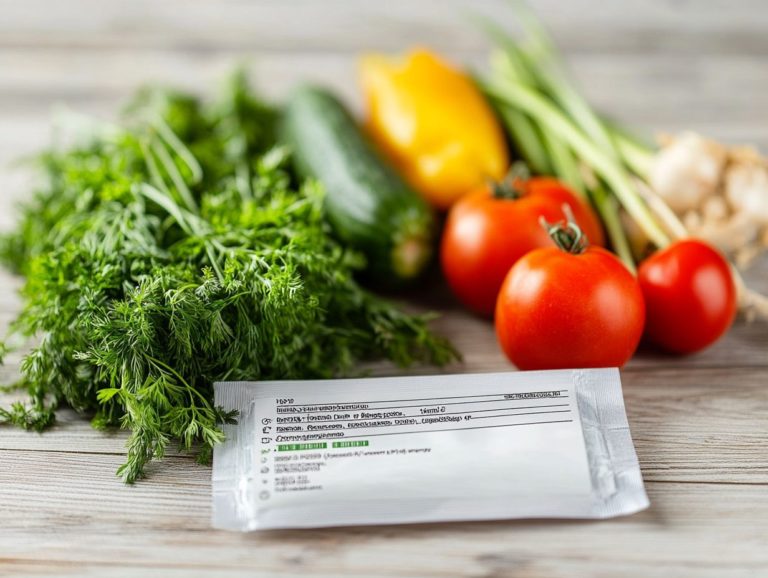What Are the Best Post-Workout Foods?
After a grueling workout, the way you fuel your body can significantly impact your recovery and overall performance.
Proper post-workout nutrition is crucial for replenishing energy stores. It also helps in repairing muscle tissue and gearing up for your next session. This article explores the key macronutrients for optimal recovery, highlights the best foods to incorporate into your post-workout meal, and emphasizes the importance of timing and hydration.
Whether you re a casual gym-goer or a committed athlete, grasping these principles can elevate your fitness journey to new heights.
Contents
Key Takeaways:
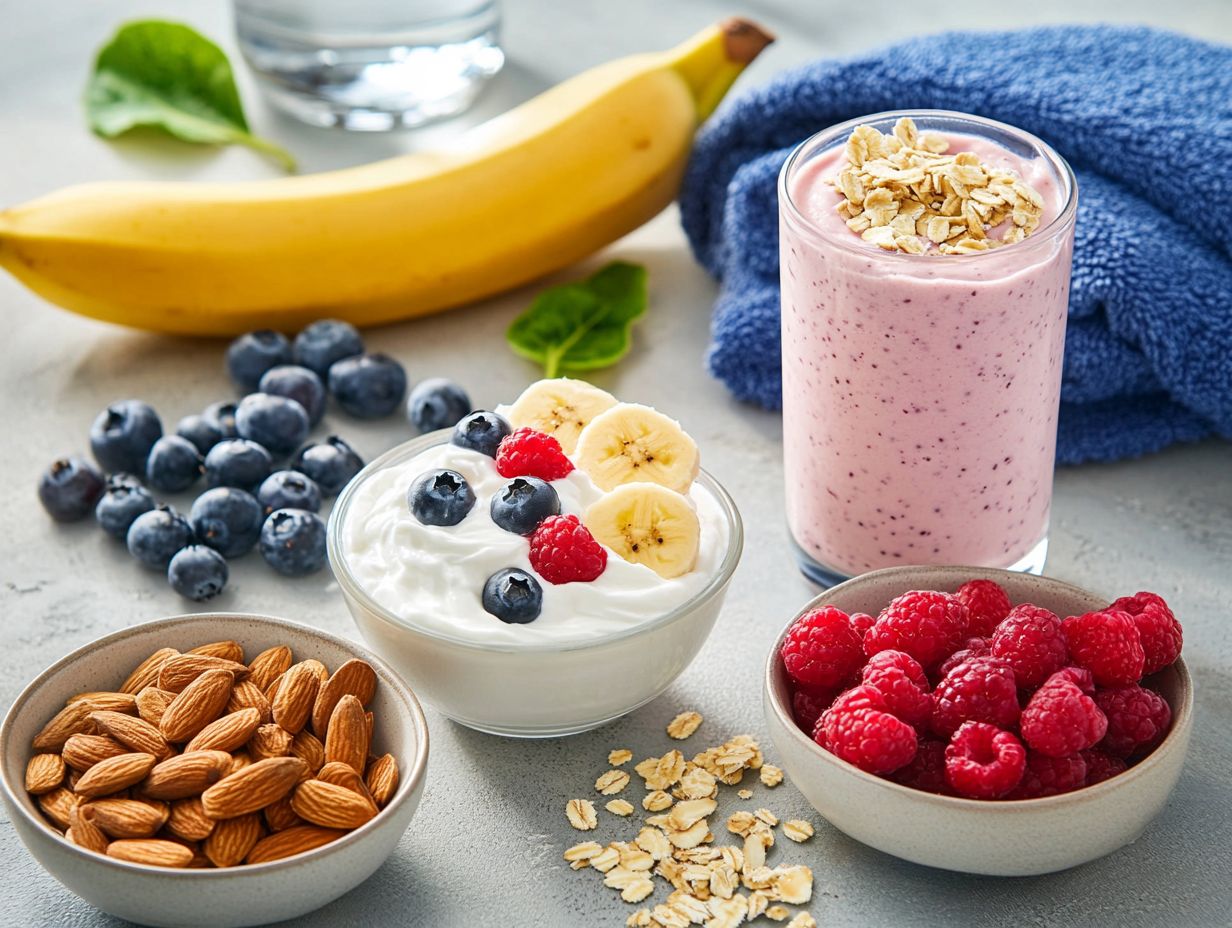
Proper post-workout nutrition is crucial for optimal recovery and muscle growth.
A balanced meal containing protein, carbohydrates, and healthy fats is essential for replenishing energy and repairing muscle tissues.
Timing is important aim to consume a post-workout meal within 30 minutes to 2 hours after exercise for maximum benefits.
Understanding Post-Workout Nutrition
Understanding post-workout nutrition is vital for optimizing your recovery, enhancing muscle growth, and ensuring you effectively replenish after your workouts. Adequate nutrition post-exercise supports your body in repairing tissues, replenishing energy reserves, and minimizing muscle soreness all critical for improving your performance in future sessions.
Focus on the right mix of nutrients and timing. This strategy can maximize your gains and overall well-being. Key components of post-workout nutrition include hydration, a balanced intake of macronutrients, and specific foods that deliver essential vitamins and minerals for optimal recovery.
The Importance of Proper Nutrition After Exercise
Proper nutrition after your workouts is crucial; it profoundly impacts your recovery, muscle rebuilding, and overall performance enhancement.
Experts agree that certain nutrients are key players in this process. Protein, for example, is vital for repairing muscle tissue that endures stress during your sessions. Nutritionists recommend a balanced intake of carbohydrates after exercise, as they help replenish energy reserves, fueling your future workouts.
Hydration is also important. Staying properly hydrated helps maintain performance levels and supports recovery. Marni Sumbal emphasizes that without adequate nutrition, you may face prolonged fatigue and subpar results. This shows why a tailored nutrition plan is important for your recovery.
Macronutrient Needs for Recovery
Grasping your macronutrient needs for recovery is essential if you engage in regular exercise. This understanding directly influences your muscle growth, repair, and overall performance efficiency.
Protein, Carbohydrates, and Fat Requirements
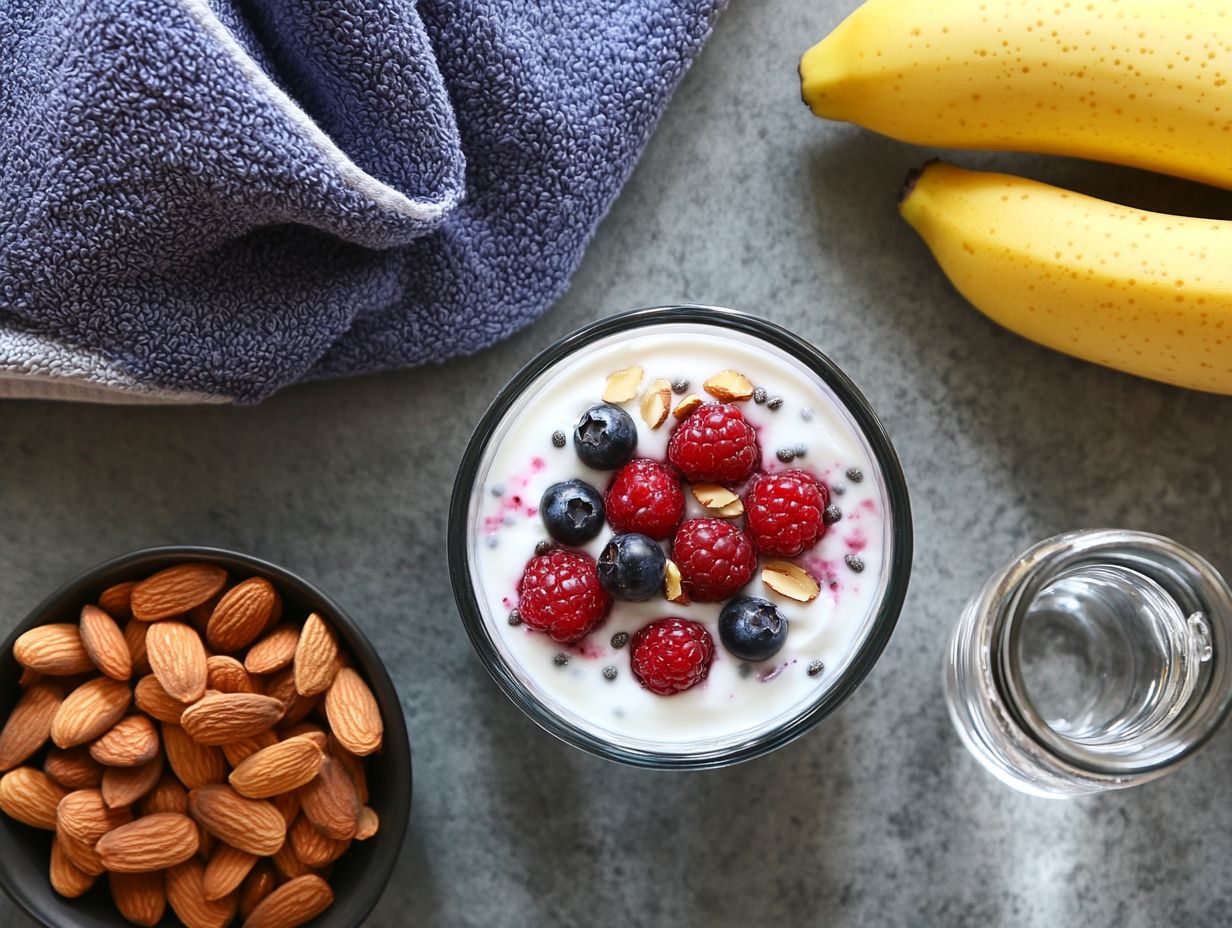
The requirements for protein, carbohydrates, and fats during your recovery are crucial for replenishing energy stores and promoting muscle repair. Properly consuming these macronutrients after your workout can significantly enhance your recovery, allowing you to bounce back and prepare for your next performance.
Nutritionists suggest aiming for an ideal protein intake of 15 to 25 grams within 30 minutes post-exercise. You can easily hit this target with options like Greek yogurt, which not only delivers high-quality protein but also offers probiotics for gut health.
Carbohydrates are equally vital; experts recommend a 3:1 ratio of carbs to protein during that essential recovery window. Foods such as sweet potatoes and whole grains will not only help replenish your energy reserves but also provide important vitamins and minerals.
Incorporating healthy fats, like those found in avocados or nuts, can further support your overall recovery by aiding cellular repair. Insights from elite athletes underscore the importance of optimizing these nutrients to maximize your gains.
The Best Post-Workout Foods
Identifying the best post-workout foods is crucial for replenishing your energy and nutrients, setting the stage for effective recovery and muscle growth.
Making informed choices in this area can significantly enhance your overall performance and well-being. Start incorporating these foods into your routine today for faster recovery and better workouts!
Top Choices for Each Food Type
When selecting your top choices for each food type proteins, carbs, and fats think about foods that are not just nutritious but also delicious and convenient for your post-workout meals and snacks.
Incorporating a balance of protein, carbohydrates, and healthy fats can greatly enhance your recovery. This balance helps replenish energy stores and repair muscle tissue.
For protein, consider options like Greek yogurt or a shake made with chocolate milk. They provide essential amino acids and satisfy those post-workout cravings.
On the carbohydrate front, fruits such as bananas or berries are excellent choices. They deliver vital sugars that swiftly restore glycogen, the energy stored in your muscles.
Don’t forget a handful of nuts or a dollop of nut butter for those beneficial fats. They support your overall recovery and keep you feeling full longer.
Combine these elements into smoothies or yogurt parfaits to create effective post-workout meals and delightful experiences.
Timing Your Post-Workout Meal
The timing of your post-workout meal is crucial for effective recovery. Consuming nutrients within the optimal window can significantly enhance muscle repair and replenish your energy stores.
Optimal Time to Refuel and Replenish
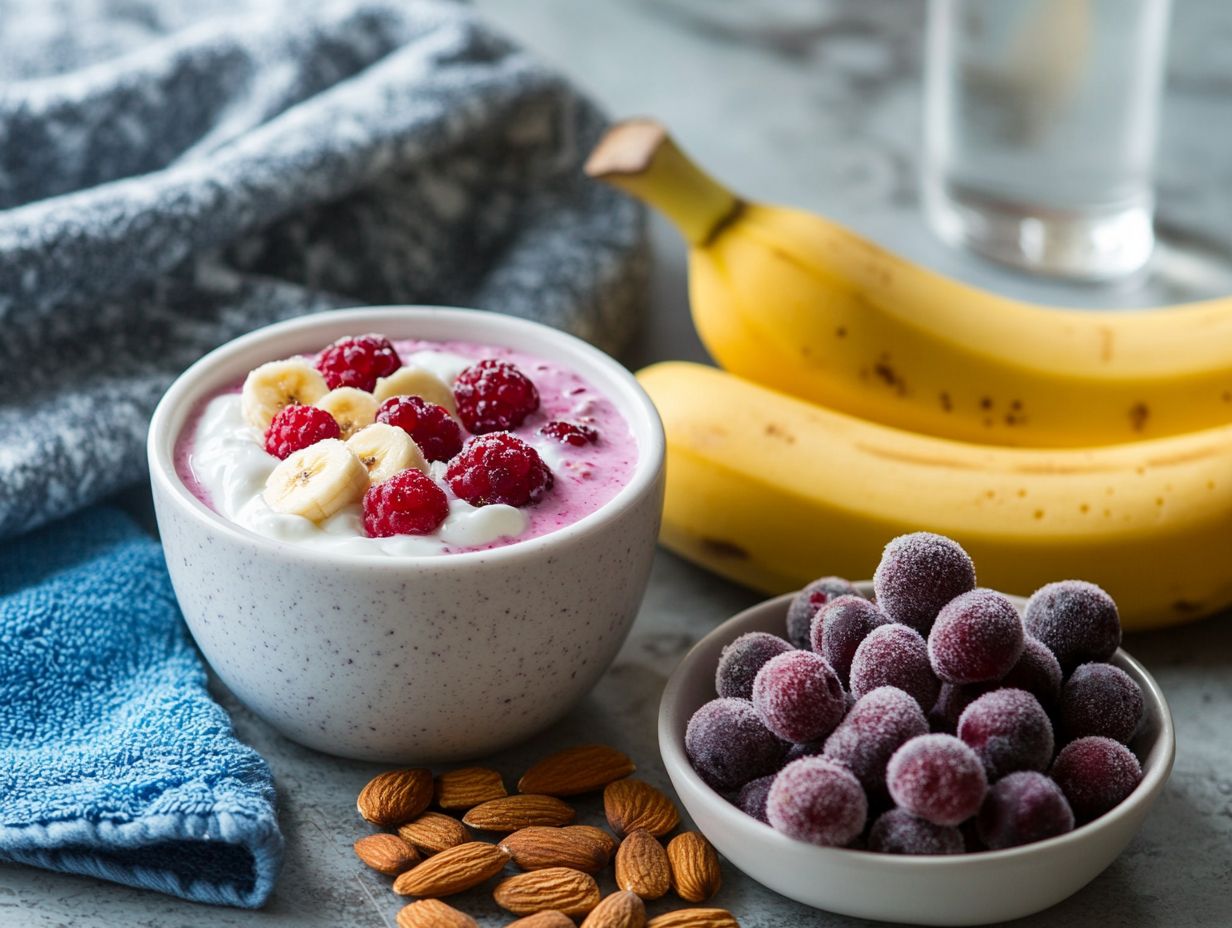
Refueling your body at the right time after a workout is essential for maximizing recovery. Experts recommend consuming post-workout nutrition within a 30 to 60-minute window to enhance muscle recovery and replenish glycogen stores effectively.
The timing may vary based on the type of exercise you do. For example, high-intensity resistance training might need quicker nutrient intake, while moderate aerobic activity may allow for a slightly longer window.
Knowing how your body responds after a workout can help you choose the right foods. Incorporating easily digestible carbohydrates and proteins like a smoothie or a protein bar can efficiently meet your post-workout needs.
Other Factors to Consider
Aside from macronutrient intake, other critical elements such as hydration, supplements, and your individual needs play a vital role in optimizing recovery after exercise.
Hydration, Supplements, and Individual Needs
Hydration and supplementation, combined with an awareness of your individual needs, are essential for optimizing recovery and enhancing performance after exercise.
Maintaining adequate fluid intake is crucial. It replenishes the salts and fluids your body loses, which are vital for cellular function and energy. Dehydration can quickly lead to fatigue, diminished strength, and endurance.
Incorporating popular supplements, such as electrolytes and branched-chain amino acids, can significantly enhance recovery. Research indicates these can help reduce muscle soreness and improve hydration status.
To effectively tailor your nutrition and hydration strategies, consider your personal goals whether aiming for weight loss, muscle gain, or improved endurance and adjust your intake according to the intensity and duration of your workouts.
Frequently Asked Questions
What Are the Best Post-Workout Foods?
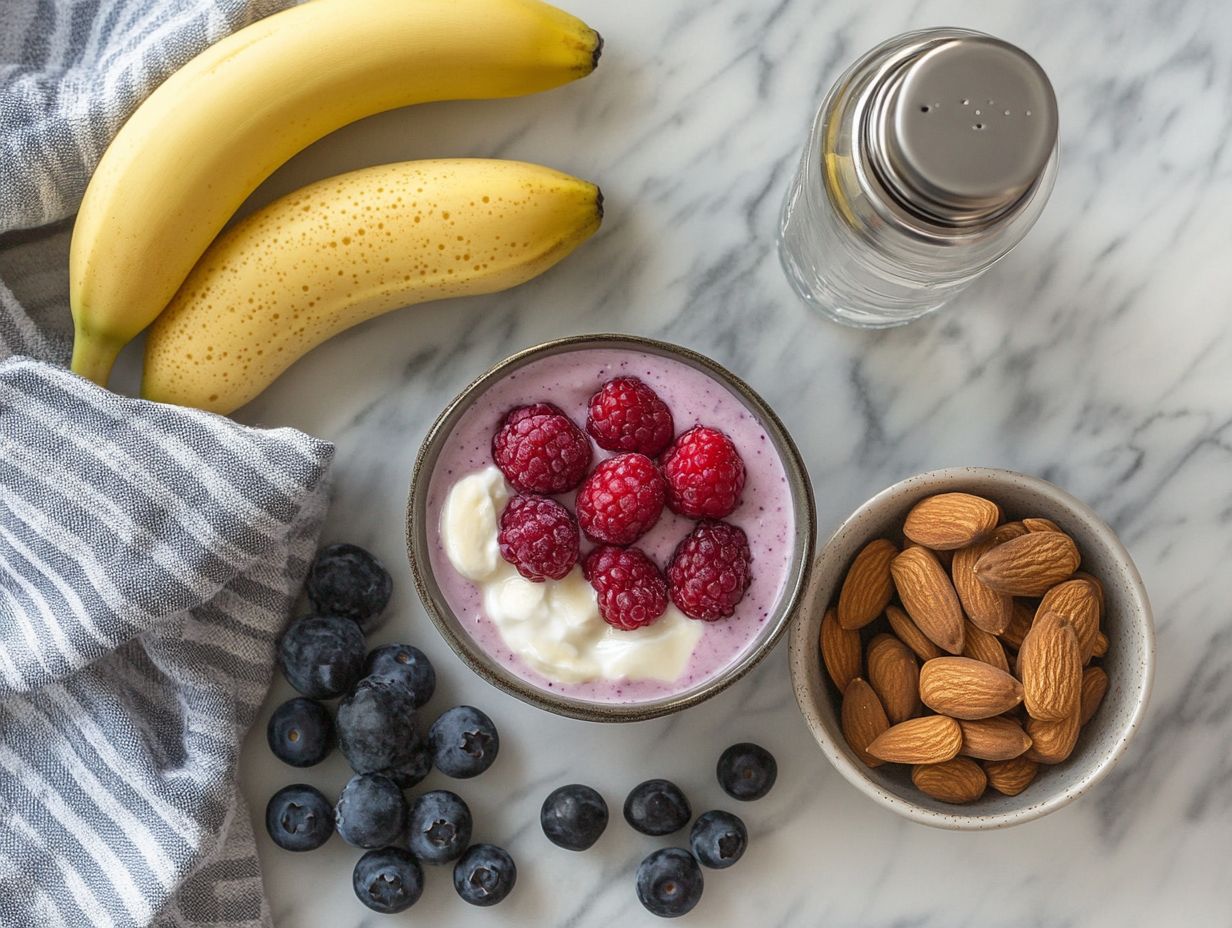
The best foods after a workout combine carbs, protein, and healthy fats. Great choices include smoothies with protein powder, turkey and avocado sandwiches, or Greek yogurt with fruit and nuts.
Why is it important to eat after a workout?
Eating after a workout is important because it helps replenish glycogen stores in the muscles, repairs muscle fibers, and aids in recovery. It also helps prevent muscle soreness and fatigue.
Can I eat anything after a workout?
Technically, you can eat anything after a workout, but it’s essential to choose nutritious foods that support your fitness goals. Avoid sugary or processed foods and opt for whole foods that provide sustained energy and proper nutrients.
Is it better to eat before or after a workout?
Eating after a workout is crucial for recovery. If you’re short on time before exercising, have a healthy post-workout meal or snack ready to enjoy within an hour.
What if I don’t have an appetite after working out?
If you re not hungry, grab a small snack or meal that s high in protein and easy to digest. Options like a protein shake, Greek yogurt, or a piece of fruit work well. Getting some nutrients is essential for your recovery.
How soon after a workout should I eat?
Eat within 30 minutes to an hour after your workout to maximize recovery benefits. Your muscles are primed to absorb nutrients during this time, which helps them rebuild. If you can t eat right away, aim for a snack or meal within 1-2 hours after exercising.

